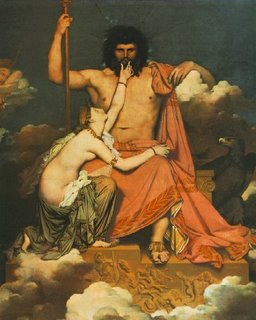ΖΕΥΣ
Thousands of years ago many people believed in a god named Zeus. He was considered to be the god of the sky and weather and his image appeared on most Greek coins. The people of Greece worshipped this idol as their god. Zeus became one of the Seven Wonders of the World.
Phidias, a famous Greek sculptor and his laborers carved a giant statue of Zeus in a special workshop behind the temple. It was made entirely of ivory and gold (Chryselephantine). When finished it sat in the temple on an elaborate throne along with sculptures and paintings of Greek myths and legends. Zeus was the most celebrated statue of ancient times because of its greatness, charm and worth.
Zeus was the supreme god and ruler of Olympus. He was known by many titles: Lord of the Sky, the Cloud- gatherer, the Rain-god and Zeus the Thunderer, all of which show which force of nature was considered to be the most important in Ancient World - rain. In most other mythologies the "ruler-god" was usually associated with the sun, but in Greece the climate is hot and dry making rain the scarce, life-giving force.
Zeus was the sixth child born to Cronus and Rhea, Because Cronus, ruler of the Titans and the supreme god at the time, was afraid that one of his children would overthrow him, just like he overthrew his father, Uranus, he swallowed his first five children - Poseidon, Hades, Hera, Demeter and Hestia. This, of course, infuriated Rhea and when Zeus was born she tricked Cronus into swallowing a rock wrapped in blankets. Zeus is more powerful than any other god or even all the other gods combined. But, unlike many gods in other religions he was neither omnipotent nor omniscient. He could be, and in fact was, opposed, deceived and tricked by gods and men alike. His power, although great, was not boundless, Zeus had no control over The Fates and Destiny. Like all Greek divinities, Zeus was subject to pleasure, pain, grief, and anger, but he was most susceptible to the power of Eros - love, which often got the objects of his desire in a lot of trouble with his wife, Hera.
Zeus was mighty, glorious, awesome and wise, although he did show a certain degree of surprising foolishness and naiveness when it came to hiding his love affairs. Some historians attribute this less than noble behavior of the "noblest one of all" to the fact that Zeus was most likely a compilation of many "supreme gods" from different areas. When his worship spread to an area which already worshipped another god, some of that god’s qualities as well as his wife or lover were transferred to Zeus. Aside from the endless affairs Zeus was different from other gods in that he did not participate in the arguments and the resulting petty scheming that made up the daily activities of other gods. Being this wise ruler, he also demanded just and righteous action from men. Zeus was however vengeful, as can be seen in The creation of man by Prometheus, but only rightly so.
Zeus had two special attendants, Nike (Victoria), the goddess of victory, and his cup-bearer, Hebe, who was one of his numerous daughters. After Hebe married Heracles, Ganymede replaced her as the cup-bearer for Zeus. In Roman Mythology, Zeus’ counterpart, Jupiter, was also attended by Fama (fame) and Fortuna (luck and chance, Tyche in Greek).
Zeus was the guardian of political order and peace. The aegis is his breastplate - so glorious and at the same time awful to behold that no human could see Zeus in all his magnificence and survive. His weapon is, of course the thunderbolt which he hurled at whoever displeased him. The thunderbolts were fashioned for him the three Cyclopes who also were the deciding power in the battle with the Titans. His bird is the Eagle, his tree - the Oak. Dodona was his oracle. His will was revealed by the rustling of oak leaves which was interpreted by his priests.
(Brexians lair)









Δεν υπάρχουν σχόλια:
Δημοσίευση σχολίου